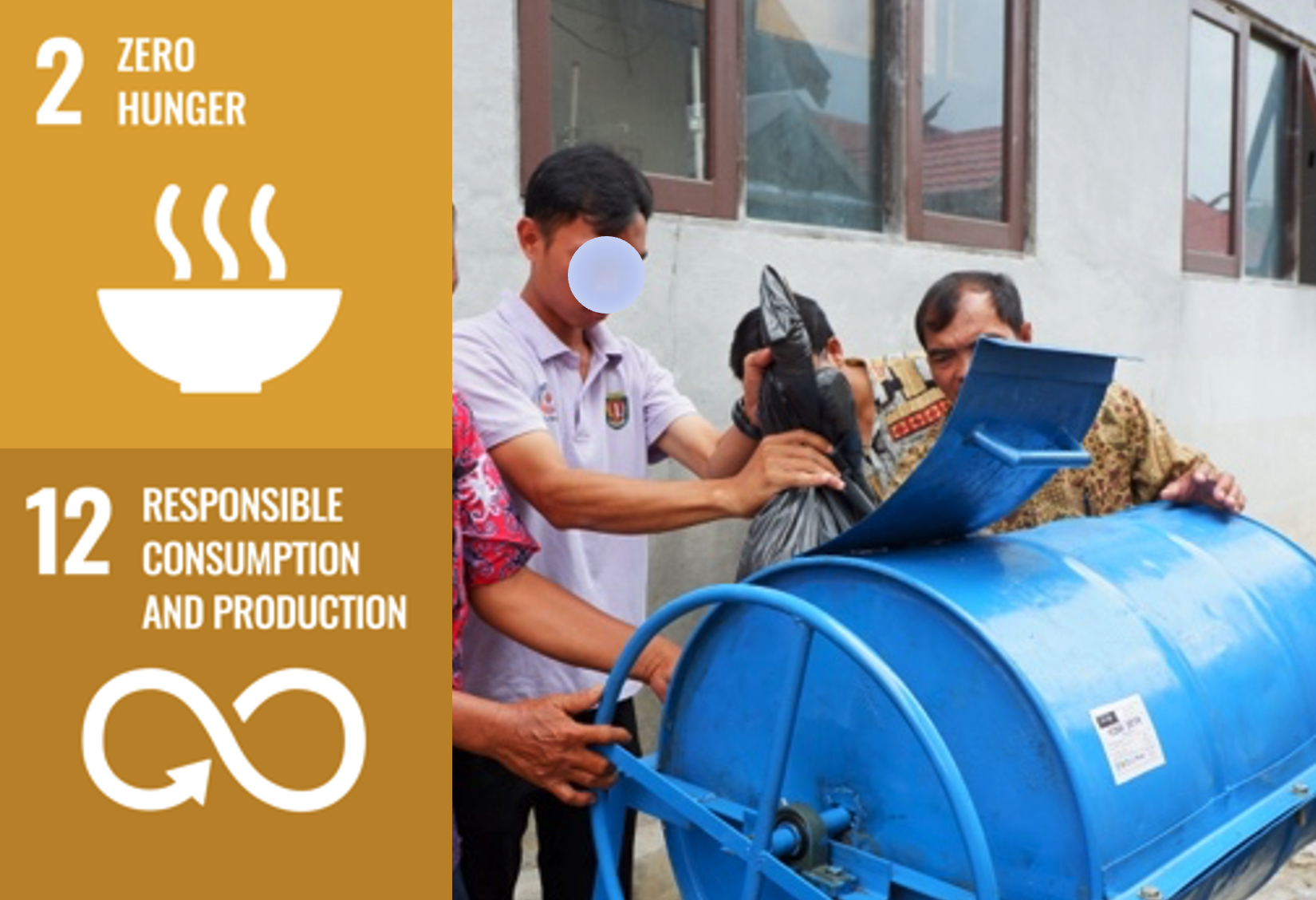Main Article Content
Abstract
Talian Kereng Village, located in Katingan Hilir District, Central Kalimantan, faces challenges regarding the availability of fertilizers for upland rice farmers on peatlands, with a heavy reliance on government-subsidized chemical fertilizers. To address this issue, a community empowerment program was implemented to promote independent organic fertilizer production using local resources. The program involved education and training for the Maju Bersama farmer group on the production of decomposers, liquid organic fertilizer (eco enzyme), and compost from household waste and harvest residues. The results showed a significant increase in knowledge, where initially, 53.9% of participants had limited understanding of decomposer and eco enzyme production, but after the training, 95.3% of participants fully comprehended the material. Furthermore, all participants became skilled in producing organic fertilizers. This program is expected to enhance farmers' self-sufficiency in meeting fertilizer needs, reduce dependence on chemical fertilizers, and support agricultural sustainability in Talian Kereng Village.
Keywords
Article Details

This work is licensed under a Creative Commons Attribution-NonCommercial 4.0 International License.
References
- Ali, H., Gustina, M., Suyanto, J., & Susanty, S. (2024). Comparison of the Concentration of Local Microorganisms (MOL) in Stale Rice During the Composting Process. Public Health of Indonesia, 10(2), 185–193. https://doi.org/10.36685/phi.v10i2.793
- Benny, N., Dash, K. K., Pandey, V. K., Shams, R., & Bashir, O. (2023). Recent trends in utilization of citrus fruits in production of eco-enzyme. Journal of Agriculture and Food Research, 13, 1–10. https://doi.org/10.1016/j.jafr.2023.100657
- BPS Kabupaten Katingan. (2023). Kecamatan Katingan Hilir Dalam Angka 2023.
- Chowdhury, A., & Sarkar, A. (2023). Vermicomposting—the sustainable solid waste management. In Waste Management and Resource Recycling in the Developing World (pp. 701–719). https://doi.org/10.1016/B978-0-323-90463-6.00013-0
- Damayanti, A., Winaningsih, I., Bahlwan, Z. A. S., Widyastuti, C. R., Auralita, K. P., Enjelita, A., & Alfareza, X. (2024). A Critical Review on Tropical Fruits Peels as Eco Enzyme: A Case of Indonesian Exotic Fruits. E3S Web of Conferences, 576. https://doi.org/10.1051/e3sconf/202457604005
- Defiani, M. R., & Astarini, I. A. (2023). Eco-enzyme enhanced the growth of rice cultivars. IOP Conference Series: Earth and Environmental Science, 1255(1). https://doi.org/10.1088/1755-1315/1255/1/012007
- Dinh, V.-P., Tran-Vu, H.-A., Tran, T., Duong, B.-N., Dang-Thi, N.-M., Phan-Van, H.-L., Tran, T.-K., Huynh, V.-H., Nguyen, T.-P.-T., & Nguyen, T. Q. (2024). Improving Soil Quality and Crop Yields Using Enhancing Sustainable Rice Straw Management Through Microbial Enzyme Treatments. Environmental Health Insights, 18. https://doi.org/10.1177/11786302241283001
- Febria, F. A., Walpajri, F., Tjong, D. H., & Zakaria, I. J. (2023). Utilization of Local Microorganisms as Bioactivators to Produce Organic Fertilizers and Analysis of Molecular Bacterial Diversity. Pakistan Journal of Biological Sciences, 26(3), 138–147. https://doi.org/10.3923/pjbs.2023.138.147
- Gunawan, J. A., Sembada, P., Firmanto, S., & Soewondo, B. I. (2022). Production of Local Microorganism by Utilizing Organic Matter in PT Ultra Peternakan Bandung Selatan. E3S Web of Conferences, 348. https://doi.org/10.1051/e3sconf/202234800018
- Hartatik, W., Husnain, & Widowati, L. R. (2015). Peranan pupuk organik dalam peningkatan produktivitas tanah dan tanaman. Jurnal Sumber Lahan, 9(2), 107–120. https://doi.org/10.2018/jsdl.v9i2.6600
- Mengqi, Z., Shi, A., Ajmal, M., Ye, L., & Awais, M. (2023). Comprehensive review on agricultural waste utilization and high-temperature fermentation and composting. Biomass Conversion and Biorefinery, 13(7), 5445–5468. https://doi.org/10.1007/s13399-021-01438-5
- Nopembereni, E. D. (2019). Ketahanan Pangan Masyarakat Perladangan di Kabupaten Barito Utara (Studi Kasus Kecamatan Gunung Timang). J-SEA: Journal Socio Economics Agriculture, 14(2), 12–18.
- Ramadani, A. hadi, Rosalina, R., & Ningrum, R. S. (2018). Pemberdayaan Kelompok Tani Dusun Puhrejo dalam Pengolahan Limbah Organik Kulit Nanas Sebagai Pupuk Cair Eco-enzim. Prosiding Seminar Nasional HAYATI VII Tahun 2019. https://doi.org/10.29407/hayati.v6i1.328
- Roidah, I. S. (2013). Manfaat Penggunaan Pupuk Organik Untuk Kesuburan Tanah. Jurnal Universitas Tulungagung BONOROWO, 1(1), 30–43.
- Rosalina, R., Chuchita, & Angga, S. (2023). Program Pelatihan Pengolahan Limbah Kulit Buah dan Sayur menjadi Eco-Enzim sebagai Pengenalan Implementasi Ilmu Kimia pada Siswa Sekolah Menengah Atas. Nawasena: Journal of Community Service, 1(1).
- Sathiyapriya, S., Prabhaharan, J., Sheeba, S., Anandham, R., & Ilamaran, M. (2024). Nutrient recycling through composting: Harnessing agricultural wastes for sustainable crop production. Plant Science Today, 11. https://doi.org/10.14719/pst.5627
- Singh, A. B., Mandal, A., Thakur, J. K., Sahu, A., Bhattacharjya, S., & Patra, A. K. (2023). Composting Technology for Organic Farming: Issues and Perspective in India. In Research Advancements in Organic Farming (pp. 81–113). https://doi.org/10.52305/XLVW8171
- Suharno, Trisna, A., Nopembereni, E. D., & Zubaidah, S. (2021). Kesiapan Masyarakat Untuk Mengembangkan Intensifikasi Usaha Tani Padi Ladang Pada Lahan Gambut Di Desa Tuwung Kecamatan Kahayan Tengah Kabupaten Pulang Pisau Provinsi Kalimantan Tengah. Jurnal AGRI PEAT, 22(2), 111–118.
- Varshini, B., & Gayathri, V. (2023). Role of Eco-Enzymes in Sustainable Development. Nature Environment and Pollution Technology, 22(3), 1299–1310. https://doi.org/10.46488/NEPT.2023.v22i03.017
- Wahyuningsih, S., Nisa, N. I. F., & Trisnawati, A. (2023). Pelatihan Pembuatan Eco-Enzyme: Solusi Ramah Lingkungan untuk Mengurangi Polusi Lingkungan. SOROT: Jurnal Pengabdi Kepada Masyarakat, 2(2). https://doi.org/10.32699/sorot.v2i2.4536

